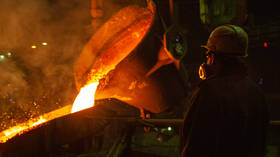Russia’s top nickel producer ditching dollar payments with China – Bloomberg

Russian mining giant Norilsk Nickel is selling some of its metal to China in yuan at prices set in Shanghai in a sign of a reshape in global commodity trade, Bloomberg reported this week.
According to people with knowledge of the matter, certain volumes of nickel were sold on the spot market at a mixed price of London Metal Exchange (LME) and Shanghai Futures Exchange (SHFE), with cargoes priced in Shanghai paid for in yuan.
The development comes as the company is looking to increase its presence in China and boost sales to the world’s largest consumer of raw materials. Russia produces nearly 10% of the global nickel supply, with Norilsk Nickel being number one in the world in terms of production of high-grade nickel, with a share of more than 20%.
While Norilsk Nickel’s major shareholder, billionaire Vladimir Potanin, was personally sanctioned by the US and the UK, the company itself has not been subjected to penalties. Still, Western buyers have avoided purchasing Russian commodities directly.
Meanwhile, Beijing is keen to clinch long-term deals and link future contracts to Shanghai prices, the outlet said, adding that negotiations are already underway and may involve a mixture of LME and SHFE pricing.
Currently, the vast majority of commodity trade in the world is based on global benchmark prices in US dollars. But the trend may change as Russia and China are looking for ways to increase trade in local currencies and cut dependence on dollars.
According to people interviewed by Bloomberg, Chinese authorities proposed to use SHFE pricing some time ago, as they believe it is more reliable than the LME.
Last March, the LME, the world’s oldest and largest exchange for industrial metals, canceled all nickel trades for eight days after prices surged by more than 50% in a matter of hours to above $100,000 a ton. The suspension left consumers and producers without key benchmark prices and damaged the exchange’s reputation.
In a recent interview with Russian RBK TV, Potanin revealed his company’s plans to restructure supply chains and focus its business on friendly nations like China, Türkiye, Morocco and the Arab states.
For more stories on economy & finance visit RT's business section













